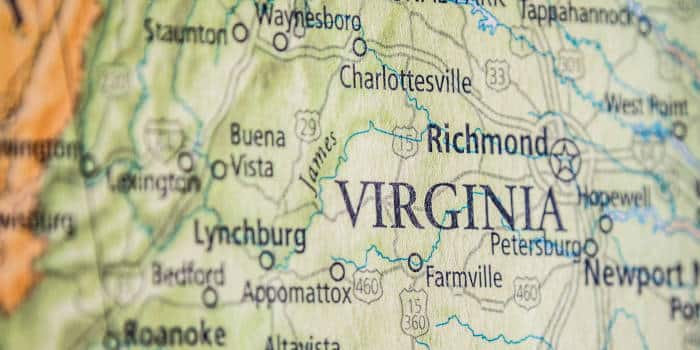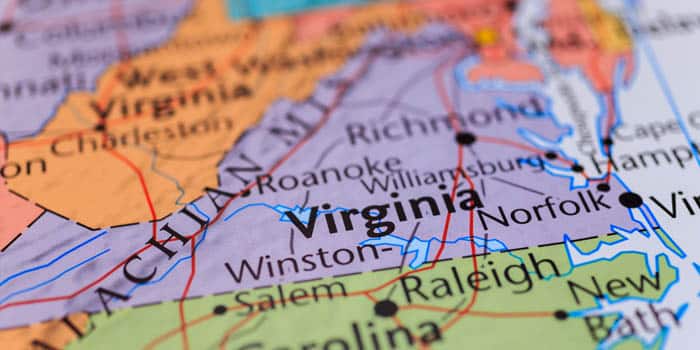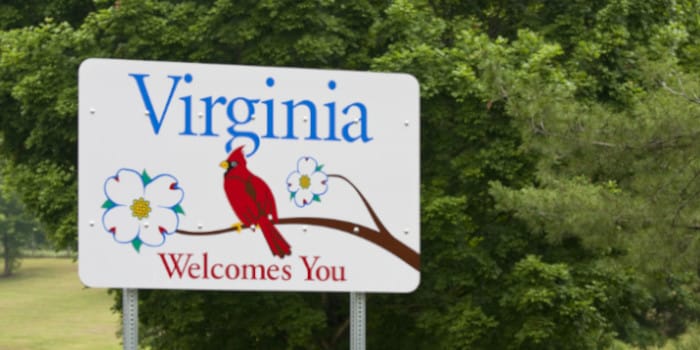- Casino
- By State
- Alabama
- Alaska
- Arizona
- Arkansas
- California
- Colorado
- Connecticut
- Delaware
- Georgia
- Florida
- Hawaii
- Idaho
- Illinois
- Indiana
- Iowa
- Kansas
- Kentucky
- Louisiana
- Maine
- Massachusetts
- Maryland
- Michigan
- Minnesota
- Mississippi
- Missouri
- Montana
- Nebraska
- Nevada
- New Hampshire
- New Jersey
- New Mexico
- New York
- North Carolina
- North Dakota
- Ohio
- Oklahoma
- Oregon
- Pennsylvania
- Rhode Island
- South Carolina
- South Dakota
- Tennessee
- Texas
- Utah
- Vermont
- Virginia
- Washington
- West Virginia
- Wisconsin
- Wyoming
- By State
- Slots
- Poker
- Sports
- Esports
State Lottery to Regulate Sports Betting in Virginia

The Virginia State Lottery will take control over sports betting after lawmakers passed regulations for the legalization of the segment on Wednesday. Estimated $43 million should be contributed to the state budget if all revenue targets are met.
Virginia Approves Sports Betting, Chooses Lottery
On Wednesday last week, Virginia finally approved sports betting regulation that would allow the state to introduce the activity. Moving forward, the Virginia State Lottery will step up as the industry’s watchdog and will be tasked with overseeing the licensing process.
Virginia will charge 15% tax on sports betting operations, which will hopefully see the state earn as much as $43 million in tax money if the projections posted at $328 million in revenue are met.
Virginia Lottery Executive Director Kevin Hall elaborated that there will be no rule that would require from operators to have a 10% hold on all revenue generated via wagering. The comment was necessary after there were some speculations that Virginia may follow the example of neighboring Tennessee, and other states that have claimed exclusivity over sports betting and limited commercial bookies.
One of the main reasons why operators didn’t want to subscribe to the “hold rule” was competitiveness. While the United States started legalizing sports wagering since May 2018, there has been some difficulty to compete with offshore sportsbooks, because of the somewhat more restrictive practices in legal markets.
Taking on the Blackjack Market
Should a state offer less competitive odds, this could prompt some sports fans to look for alternatives elsewhere, and specifically black markets. Thanks to the more liberal approach in Virginia, however, the state will join its sister state, West Virginia, in establishing a regulatory climate where the lottery wouldn’t interfere with the operations of commercial sportsbooks, giving them a more competitive leeway.
In contrast, other states where sports betting has been legalized but is regulated by a lottery, things look slightly more contentious and difficult from the standpoint of a sports betting operator.
Restrictions Eliminated in Legal Make-up
For example, Washington D.C. has decided not to launch an official licensing process. Instead, the lottery invited Intralot to extend its offer to sports betting and run it in a centralized manner.
In New Hampshire, legislators were happy to allow 10 land-based wagering properties to operate in the state, along with five online offerings. However, the state lottery chose DraftKings as an exclusive partner with 51% of all proceeds going back to the state.
Meanwhile, Virginia will not allow betting on collegiate sports, although there will be an in-state team waiver. However, collegiate events that take place in the state – but do not involve in-state teams – will be events that punters can bet on.
This way, Virginia can still benefit from the huge interest around NCAA events if the state ever ends up hosting a major competition and doesn’t want to legally deadlock itself out of tax dollar.
The state is readying up to also launch a casino project in Danville as part of the state’s two-pronged approach towards gambling across both major verticals.
Related Topics:
Jerome brings a wealth of journalistic experience within the iGaming sector. His interest in the industry began after graduating from college, where he regularly participated in local poker tournaments. This exposure led him to the growing popularity of online poker and casino rooms. Jerome now channels all the knowledge he's accrued to fuel his passion for journalism, providing our team with the latest scoops online.
More Articles





Industry
February 26, 2025
Norfolk Casino Picks up Speed with Construction Works Start

Industry
January 28, 2025
Tysons Residents Voice Strong Opposition to Casino Project

Casino
January 23, 2025
Virginia Puts Online Gaming Bill on Hold for Further Analysis

Industry
January 10, 2025
Tysons Casino Project Bill Returns to Virginia Lawmakers







